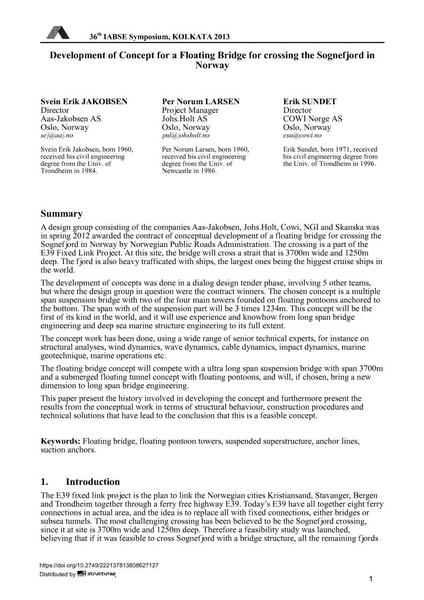Development of Concept for a Floating Bridge for crossing the Sognefjord in Norway

|
|
|||||||||||
Bibliografische Angaben
| Autor(en): |
Svein Erik Jakobsen
Per Norum Larsen Erik Sundet |
||||
|---|---|---|---|---|---|
| Medium: | Tagungsbeitrag | ||||
| Sprache(n): | Englisch | ||||
| Tagung: | IABSE Symposium: Long Span Bridges and Roofs - Development, Design and Implementation, Kolkata, India, 24-27 September 2013 | ||||
| Veröffentlicht in: | IABSE Symposium Kolkata 2013 | ||||
|
|||||
| Seite(n): | 1-5 | ||||
| Anzahl der Seiten (im PDF): | 5 | ||||
| Jahr: | 2013 | ||||
| DOI: | 10.2749/222137813808627127 | ||||
| Abstrakt: |
A design group consisting of the companies Aas-Jakobsen, Johs.Holt, Cowi, NGI and Skanska was in spring 2012 awarded the contract of conceptual development of a floating bridge for crossing the Sognefjord in Norway by Norwegian Public Roads Administration. The crossing is a part of the E39 Fixed Link Project. At this site, the bridge will cross a strait that is 3700m wide and 1250m deep. The fjord is also heavy trafficated with ships, the largest ones being the biggest cruise ships in the world. The development of concepts was done in a dialog design tender phase, involving 5 other teams, but where the design group in question were the contract winners. The chosen concept is a multiple span suspension bridge with two of the four main towers founded on floating pontoons anchored to the bottom. The span with of the suspension part will be 3 times 1234m. This concept will be the first of its kind in the world, and it will use experience and knowhow from long span bridge engineering and deep sea marine structure engineering to its full extent. The concept work has been done, using a wide range of senior technical experts, for instance on structural analyses, wind dynamics, wave dynamics, cable dynamics, impact dynamics, marine geotechnique, marine operations etc. The floating bridge concept will compete with a ultra long span suspension bridge with span 3700m and a submerged floating tunnel concept with floating pontoons, and will, if chosen, bring a new dimension to long span bridge engineering. This paper present the history involved in developing the concept and furthermore present the results from the conceptual work in terms of structural behaviour, construction procedures and technical solutions that have lead to the conclusion that this is a feasible concept. |
||||
